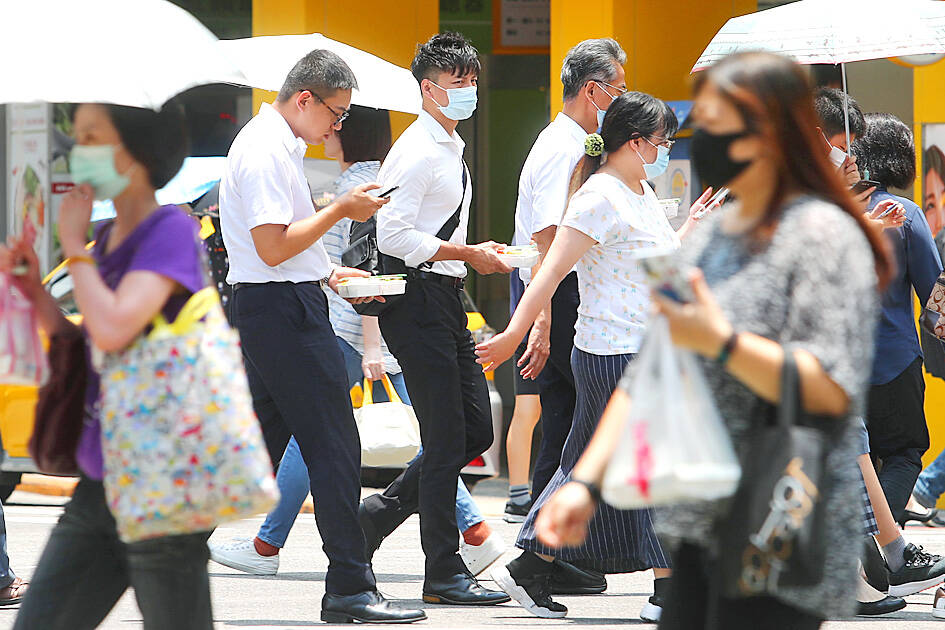About 73 percent of employers in Taiwan reported recruitment difficulties, with those trying to hire workers with IT and data skills facing the most significant challenge, a survey released yesterday by human resources advisory firm ManpowerGroup showed.
In its latest global talent shortage report, ManpowerGroup surveyed more than 40,000 people in 41 countries and regions, including 630 in Taiwan, finding that 75 percent of employers worldwide were dealing with a talent shortage, slightly higher than Taiwan’s 73 percent.
In Japan, about 85 percent of employers said they found it hard to fill job vacancies, the highest rate among those surveyed, followed by Germany, Greece and Israel (all 82 percent); Ireland, Portugal and India (all 81 percent); and the UK, France, Canada and Brazil (all 80 percent).

Photo: CNA
About 79 percent of employers in Singapore said they had trouble filling vacancies, while 70 percent surveyed in the US and 69 percent in China also reported hiring issues.
ManpowerGroup Taiwan general manager Joan Yeh (葉朝蒂) said in a statement that talent shortages have become a universal phenomenon.
With the emergence of artificial intelligence (AI) applications, cultivating AI talent has become an important task for employers worldwide, Yeh said.
In Taiwan, 78 percent of employers in the transportation, logistics and auto businesses faced challenges finding talent, the highest of all major industries, followed by industrial and raw materials sectors (77 percent), the survey found.
The talent shortage in the local transportation, logistics and auto industries comes amid an explosion in spending in the post-COVID-19 pandemic era, with many people rushing to take trips and splurge on entertainment activities, which has prompted logistics operators and airlines to expand hiring to meet demand, Yeh said.
Thirty-five percent of employers in Taiwan said that finding workers with IT and data skills was most challenging, ahead of those with engineering skills (26 percent), manufacturing and production skills (24 percent), human resources skills (23 percent), and sustainability and environmental skills (20 percent).
The shortage of workers with IT and data skills reflects the growing demand for AI applications, while many businesses also need employees to analyze data and enhance cybersecurity, Yeh said.
Companies also need to recruit human resources professionals to help them find the right personnel to facilitate AI development, she added.
Tackling the talent shortage would require employers in Taiwan to provide more flexible work schedules, higher compensation and the ability for employees to work remotely, the survey said.
Such flexibility demonstrates a company’s awareness of the importance of retaining, as well as recruiting, talent, Yeh said.
Seventy percent of employers in Taiwan said that they were worried about an economic slowdown, the survey showed.
Based on those concerns, employers are expected to freeze hiring and cut training budgets, which could make it challenging for employees to acquire necessary skills, Yeh said.

‘DENIAL DEFENSE’: The US would increase its military presence with uncrewed ships, and submarines, while boosting defense in the Indo-Pacific, a Pete Hegseth memo said The US is reorienting its military strategy to focus primarily on deterring a potential Chinese invasion of Taiwan, a memo signed by US Secretary of Defense Pete Hegseth showed. The memo also called on Taiwan to increase its defense spending. The document, known as the “Interim National Defense Strategic Guidance,” was distributed this month and detailed the national defense plans of US President Donald Trump’s administration, an article in the Washington Post said on Saturday. It outlines how the US can prepare for a potential war with China and defend itself from threats in the “near abroad,” including Greenland and the Panama

The Chinese Nationalist Party (KMT) is maintaining close ties with Beijing, the Democratic Progressive Party (DPP) said yesterday, hours after a new round of Chinese military drills in the Taiwan Strait began. Political parties in a democracy have a responsibility to be loyal to the nation and defend its sovereignty, DPP spokesman Justin Wu (吳崢) told a news conference in Taipei. His comments came hours after Beijing announced via Chinese state media that the Chinese People’s Liberation Army’s Eastern Theater Command was holding large-scale drills simulating a multi-pronged attack on Taiwan. Contrary to the KMT’s claims that it is staunchly anti-communist, KMT Deputy

RESPONSE: The government would investigate incidents of Taiwanese entertainers in China promoting CCP propaganda online in contravention of the law, the source said Taiwanese entertainers living in China who are found to have contravened cross-strait regulations or collaborated with the Chinese Communist Party (CCP) could be subject to fines, a source said on Sunday. Several Taiwanese entertainers have posted on the social media platform Sina Weibo saying that Taiwan “must be returned” to China, and sharing news articles from Chinese state media. In response, the Mainland Affairs Council (MAC) has asked the Ministry of Culture to investigate whether the entertainers had contravened any laws, and asked for them to be questioned upon their return to Taiwan, an official familiar with the matter said. To curb repeated

Myanmar has turned down an offer of assistance from Taiwanese search-and-rescue teams after a magnitude 7.7 earthquake struck the nation on Friday last week, saying other international aid is sufficient, the National Fire Agency said yesterday. More than 1,700 have been killed and 3,400 injured in the quake that struck near the central Myanmar city of Mandalay early on Friday afternoon, followed minutes later by a magnitude 6.7 aftershock. Worldwide, 13 international search-and-rescue teams have been deployed, with another 13 teams mobilizing, the agency said. Taiwan’s search-and-rescue teams were on standby, but have since been told to stand down, as